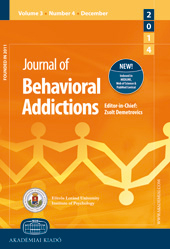Who uses self-exclusion to regulate problem gambling? A systematic literature review
Who uses self-exclusion to regulate problem gambling? A systematic literature review
Author(s): Franziska Motka, Bettina Grüne, Pawel Sleczka, Barbara Braun, Jenny Cisneros Örnberg, Ludwig KrausSubject(s): Behaviorism
Published by: Akadémiai Kiadó
Keywords: self-exclusion; systematic reviews; regulations; problem gambling; Internet gambling; terrestrial gambling
Summary/Abstract: Self-exclusion programs offer an intervention for individuals with problem gambling behavior. However, these programs are insufficiently used. This review describes sociodemographic features and gambling behavior of self-excluders as well as goals and motives for initiating self-exclusion from terrestrial and online gambling. In addition, use of further professional help and barriers to self-exclusion are examined. Methods. Based on systematic literature search and quality assessment, n = 16 original studies (13 quantitative, 2 qualitative, and 1 mixed method) published between 1997 and 2017 in English or German language were analyzed. Results are presented for online and terrestrial gambling separately. Results. Online self-excluders were on average 10 years younger than terrestrial self-excluders. Self-exclusion was mainly motivated by financial problems, followed by feelings of losing control and problems with significant others. Financial problems and significant others were less important for online than for terrestrial gamblers. Main barriers for self-exclusion were complicated enrollment processes, lack of complete exclusion from all venues, little support from venue staff, and lack of adequate information on self-exclusion programs. Both self-excluders from terrestrial and online gambling had negative attitudes toward the need of professional addiction care. Conclusion. To exploit the full potential of self-exclusion as a measure of gambler protection, its acceptance and its utilization need to be increased by target-group-specific information addressing financial issues and the role of significant others, simplifying the administrative processes, facilitating self-exclusion at an early stage of the gambling career, offering self-determined exclusion durations, and promoting additional use of professional addiction care.
Journal: Journal of Behavioral Addictions
- Issue Year: 7/2018
- Issue No: 4
- Page Range: 903-916
- Page Count: 14
- Language: English

